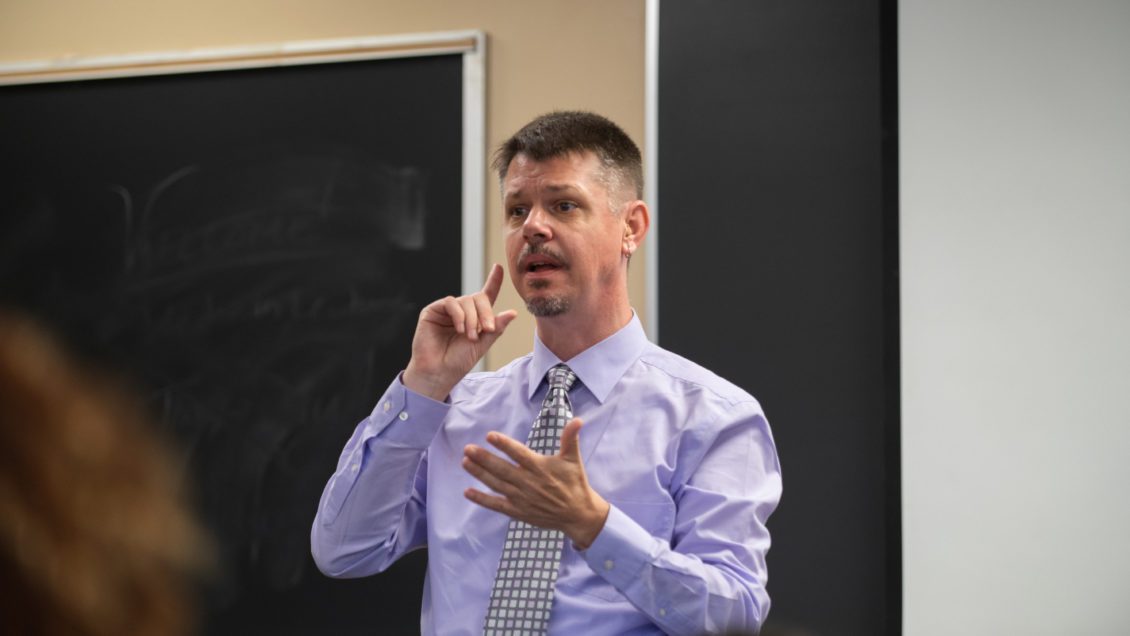The South Carolina Educational Interpreting Center at Clemson University is reopening for a new five-year cycle thanks to $1.4 million in funding from the South Carolina Department of Education. The center, which trains interpreters working in K-12 schools with specific skills for educational interpreting, is the only one of its kind in the nation.
“We are immensely grateful to the Department of Education for renewing their support of this program,” said Nicholas Vazsonyi, Dean of the College of Architecture, Arts and Humanities. “Our American Sign Language (ASL) faculty are national leaders, and I am immensely proud of what they have accomplished in such a short period. The SCEIC allows them to expand their impact to K-12 schools across the state, which is a crucial part of our mission as a land-grant institution.”
This ensures that all students who are deaf or hard of hearing have equitable access to the school setting, including instruction as well as extracurricular services, through highly qualified educational interpreters.”
Beckie Davis, Director of Special Education Services, S.C. Department of Education
The SCEIC first launched in 2016 after Clemson ASL faculty and the SC Department of Education saw that not all interpreters working in K-12 public schools had the competencies needed for the classroom environment, and that local school districts were not equipped to evaluate the quality of interpretation.
“The general population doesn’t know when interpreting is happening, when it’s effective, or when it’s not,” said Stephen Fitzmaurice, associate professor of Interpreting: ASL, who oversees the Center. He says the challenges of effective interpreting only increase when working with children.
“The general education for any student, hearing or deaf, is to learn language as you’re going through the educational program. And so, how do you interpret for someone who doesn’t have even the foundations of language?” he said. “It’s akin to asking you to read ancient Chinese characters without knowing any Chinese.”
Fortunately, teaching interpreters the challenges of educational interpreting for children is a specialty of Clemson’s undergraduate ASL program. The SCEIC uniquely extends the expertise of Clemson’s faculty to interpreters who are working in the K-12 environment but may have been trained for interpreting in other settings. Specifically, the Center seeks to improve interpreters score on the Education Interpreter Performance Assessment (EIPA). According to Fitzmaurice, interpreters must score above 3.0 on the exam’s 5-point scale to be effective in the classroom.
“When we started the project in 2016, the first pieces of data we got back indicated that the state mean was 2.8,” Fitzmaurice explained. “By the end of 2017, which continued to 2018, we got them to a 3.2, and by the end of 2020, we got them to a 3.4.”
“The Office of Special Education Services at the South Carolina Department of Education is excited to continue our partnership with the Interpreting Center,” said Beckie Davis, Director of Special Education Services with the South Carolina Department of Education. “This ensures that all students who are deaf or hard of hearing have equitable access to the school setting, including instruction as well as extracurricular services, through highly qualified educational interpreters.”
The program was put on hold in 2020 due to the pandemic, and funding was halted because the exams and training required face-to-face interaction, Fitzmaurice said. The new agreement with the South Carolina Department of Education renews the program for the coming school year and extends it to 2026. Although the Center is the only one of its kind in the U.S., Fitzmaurice hopes it can serve as a model for other states.
The South Carolina Educational Interpreting Center is located at the University Center of Greenville, but also maintains regional training locations throughout the state. Schools or districts interested in partnering with the SCEIC should contact Stephen Fitzmaurice at sfitzma@clemson.edu or call 864-250-8890.
Get in touch and we will connect you with the author or another expert.
Or email us at news@clemson.edu

